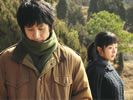Eye For Film >> Movies >> Paju (2009) Film Review
The second feature from one of Korea's few female directors, Paju has been given major billing in the Korean Film Festival line up, which is promoting this year as a banner year for women in front of and behind the camera. For her follow-up to her debut Jealousy Is My Middle Name, director Park Chan-ok spins a disjointed, dark narrative of guilt and repressed desire that is well-acted but doesn't ultimately add up to as much as it promises.
In a story broken up into puzzle-pieces that spans a decade, we see activist Joong-shik (Lee Seon-gyun) fleeing in the mid-Nineties to the developing town of Paju, having accidentally caused a serious injury to his lover’s infant son. Laying low to avoid arrest, Joong-sik eventually falls in love and marries Eunsoo (Shim Yi-young) who is living with her younger sister, Eunmo (Seo woo). However, Eunsoo is tragically killed, causing her grief-stricken sister to use her college funds to flee to India while Joong-sik is arrested.

Returning to Paju in 2003, Eunmo finds Joong-sik is an activist once more, now a leader of squatters who fight against the demolition of their apartment complex. But reuniting with her brother-in-law stirs up all the mixed emotions she once had for him, which become even more complex as she fears Joong-sik might have killed her sister. Viewer's expectations and preconceptions shift, however ,as the narrative puzzle is revealed, and we learn more about the history and nature of Eunmo's complex relationship with Joong-sik.
Paju's main stylistic feature - the use jarring flashbacks to tell its story- certainly helps to keep the audience guessing. But given the same actors are playing the same roles throughout, despite the massive time jumps in the narrative, it can be very hard to distinguish when a particular event on screen is occurring. This is particularly a problem with actress Seo Woo, who plays Eunmo both as a young schoolgirl and adult throughout. Surely someone that young would go through significant physical changes over the timespan covered by the film, yet beyond a hair adjustment she looks the same in all time periods. What should be a stylistic strength, by the end feels somewhat superfluous and distracting - the story would probably still have kept its power had it unfolded chronologically.
Paju ends up being a murky, thoughtful, but over-complicated experience. The film's characters spend their screen time wallowing in guilt and uncertainty, rarely expressing themselves clearly or seeing the entire picture. A fragmented narrative, characters misunderstanding or not seeing the causes behind certain on-screen events - everything is designed here to create a stylish, noir-like air of ambiguity. There are some very good performances to enjoy, particularly young actress Seo Woo, who brings an intense and mature performance to the table in all the ages she plays, even if it hard to tell what time period she is in. But Paju is also a film which seems purposefully designed to be hard to find a way into.
Reviewed on: 16 Nov 2010

















